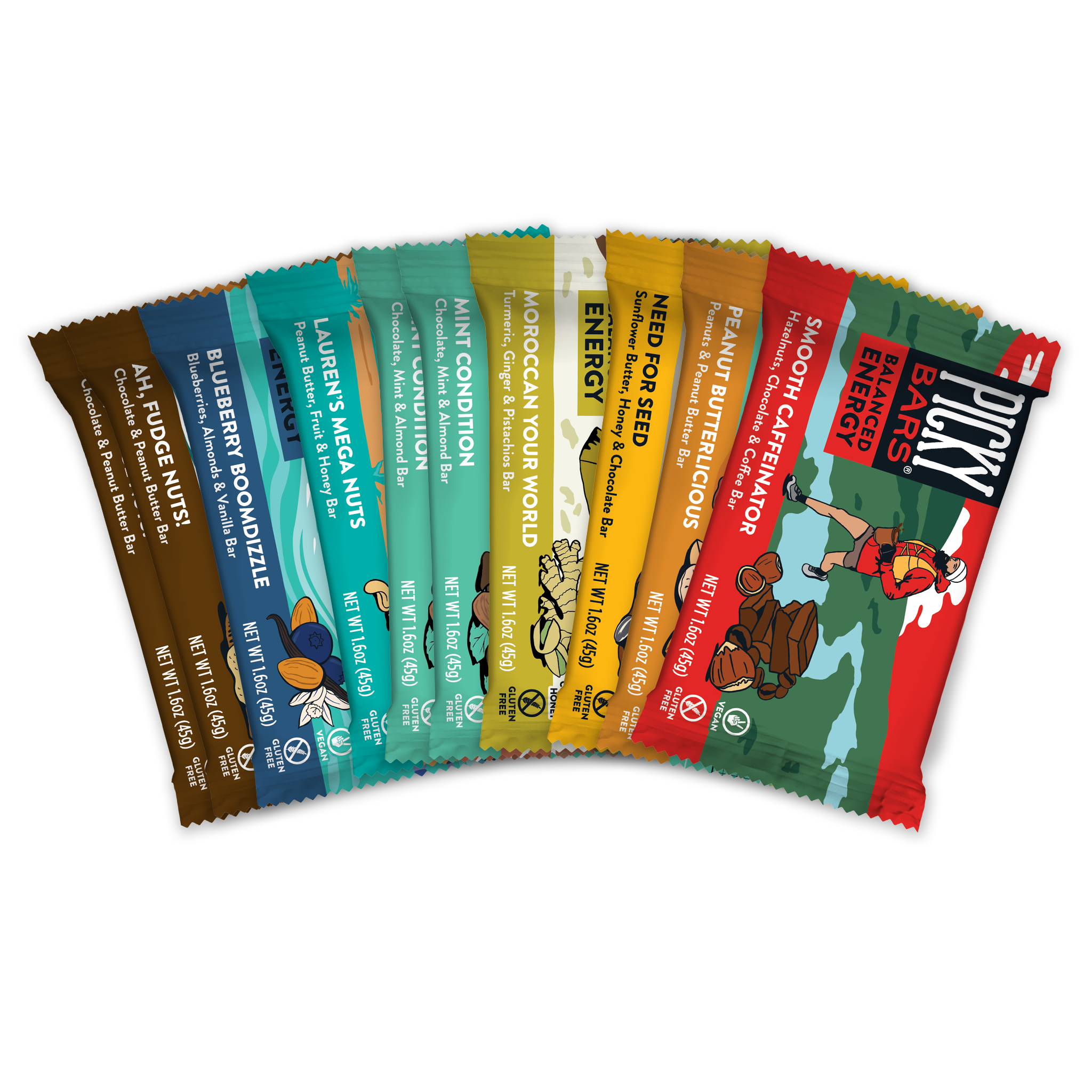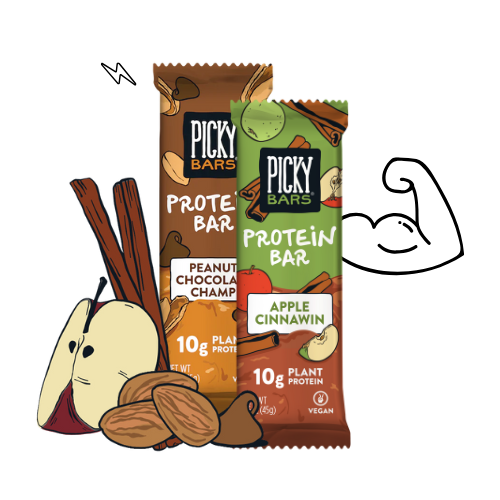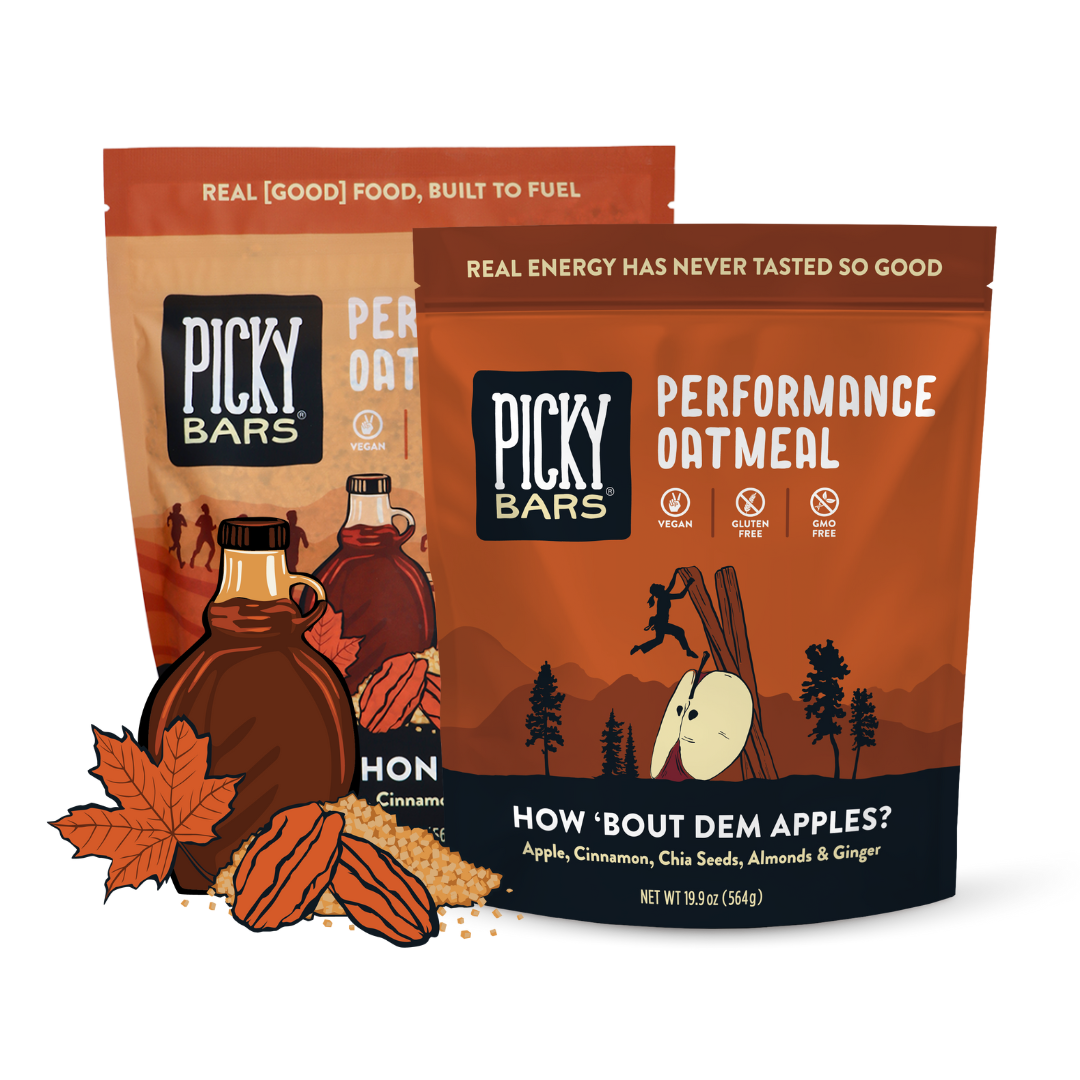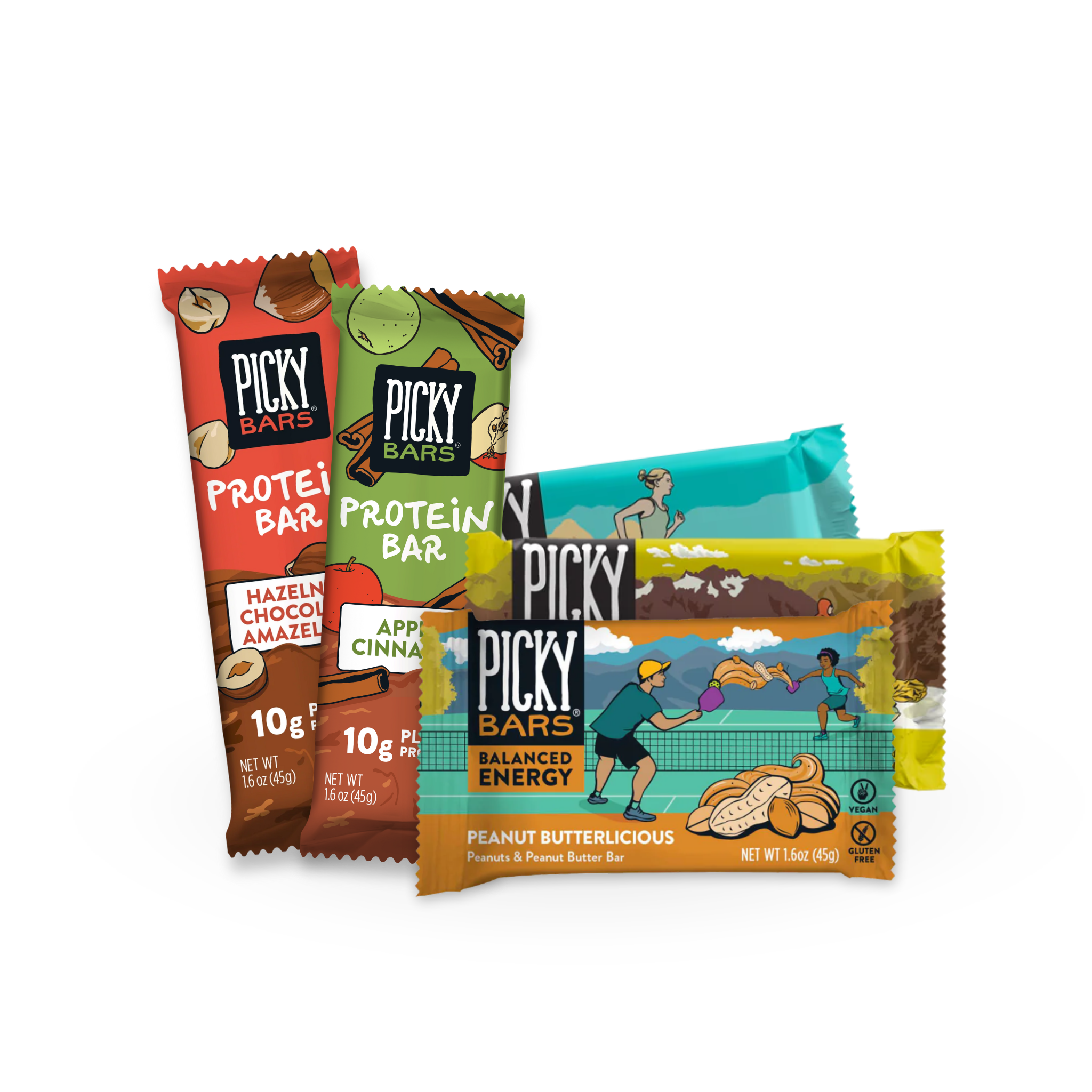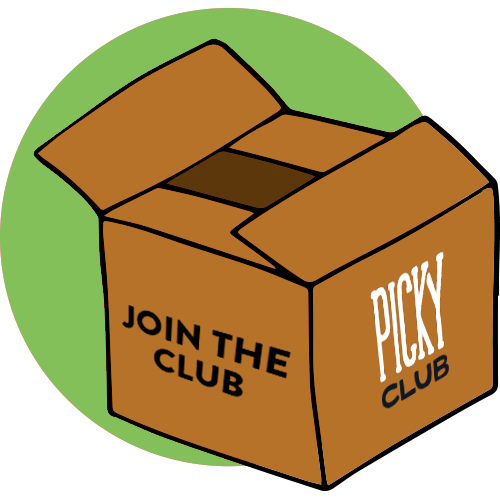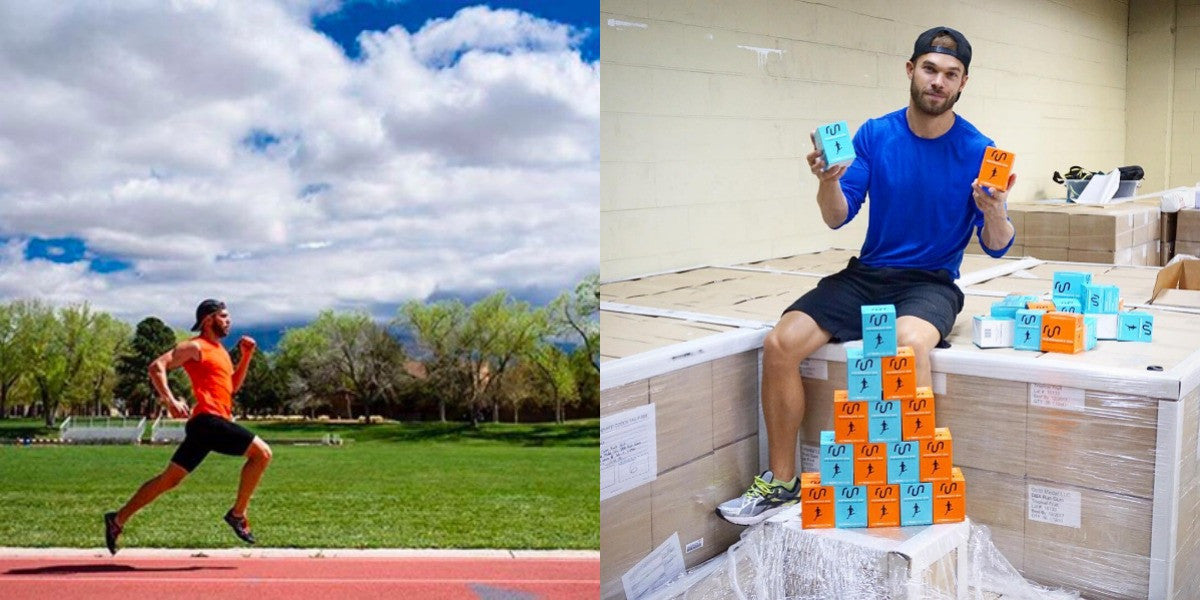

· By Sarah Conklin
Nick & Jesse: Athlete-preneurs
Nick Symmonds the athlete on the track, Nick Symmonds the business man at Run Gum HQ
Give us a bird’s eye view of your typical day:
Nick Symmonds: I wake up around 6:30 AM and have a cup of coffee (yes, I own a caffeinated gum company but still love my morning cup of coffee). I read the news, shower, and get dressed to workout. Workouts are usually from 8-10 AM. I then shower, eat lunch, and head to the Run Gum HQ. I'm usually pretty sleepy from the workout and meal so I pop a couple pieces of Run Gum for a quick energy boost and try to work from noon-6 PM. I like to wrap up the day with a beer or two and a big dinner. I'm usually asleep by 10 PM.
Jesse Thomas: Wake up, swim, order breakfast burrito for pickup on the way to the office, work, lunch, sometimes nap if there's time/I’m dead, some combo of bike/run/lift, collapse back home but can’t be tired yet because Jude wants to play pirate, or pillow fight, or wrestle, or pirate pillow fight wrestle, dinner, read Jude to sleep, hang out with Lauren, maybe a short TV show, read, bed. Wake up, repeat. 7 days a week.
What parallels do you see between biz + training/racing?
NS: Running a business and competing at an elite level both require a ton of hard work, sacrifice, and dedication. I've found that to be successful at anything really only requires one characteristic: PERSEVERANCE. Perseverance is all it takes to overcome any obstacle in life.
JT: Tons. Set goals, make a plan, get your team on the same page (employees or coach/sponsors/supporters), work your ass off, win some, lose some, adjust the plan, reset goals, repeat. It’s the same cycle over and over again. And I love it because it doesn’t always work out the way you want it to, which makes it especially awesome when it does.
What’s been the biggest challenge of your career - both biz and athletic?
NS: Dealing with injuries has by far been the biggest challenge of my athletic career. Ironically enough, I was only able to bring Run Gum to market due to a season ending injury sustained in 2014. Having watched Lauren make Picky Bars in her home kitchen while injured certainly was an inspiration! The biggest challenge for me in business thus far has been embracing the act of learning again. For over a decade I was largely out of the workforce utilizing my athletic talents to earn a living. When I began work on Run Gum in 2014 I realized that the world had changed a lot since I'd last held a real job! From computer programs to marketing strategies, everything has evolved and I had to embrace being a student again.
JT: Balancing them with family. It’s no secret to me and my family that I have too much on my plate right now, so I’m in a constant state of letting someone down - either employees, coach, family, or myself. It’s a fine balance and you have to constantly prioritize, every day, every hour even. It’s a lot, but I do the best I can, and my family supports this stage of my life, in part because they know it’s not forever, which would be unsustainable.
What tips do you have for balancing work, training, and regular life?
NS: Find the schedule that works best for you and then stick with it. I know a lot of people that like to workout after work. They find that its a great way to blow of steam and relax. That couldn't be more opposite for me. By 6 PM all I want to do is grab a beer and kick my feet up. However, I LOVE to workout in the mornings. I do some of my best thinking when I am working out and that creative energy stays with me all day.
JT: Understand your goals and make priorities from them. Communicate them with your “team” (significant others, employees, coach, etc). There may be negotiation (particularly with significant other!) so be prepared to work through that and be flexible. You have to find that balance of what will make you and your team happiest across all three, and prioritize each day accordingly. There will likely always be more than you can do, but if you get the most important stuff done, you’ll be alright.

Triathlete Jesse on the trails, CEO/husband/dad Jesse at the office
Both Run Gum and Picky Bars were born out of a place of athlete and public needs/desires. What was it that convinced you to give life to the idea?
NS: To be honest, I initially created Run Gum for personal use. I loved the way energy drinks made me feel, but they were horrible to my stomach. I wanted all the stimulants of an energy drink without having to ingest anything. I told my longtime mentor, Sam Lapray, that I was working on infusing caffeine, taurine, and b-vitamins into a piece of chewing gum. Sam was the one that said we needed to bring the product to market. We had no idea if people would accept the idea, but as people tried Run Gum and experienced the amazing, near instant, energy boost for themselves they were hooked. An astonishingly large percentage of our business comes from repeat customers.
JT: Steph Bruce, our co-founder. She and Lauren had the idea to make and sell these bars, and Steph went and told the world about it so they'd actually have to do it! I came along after they were up and running and needed help starting to build it out. Without Lauren’s ideas and Steph’s passion, it never would have gone anywhere.
When did you realize you had a real chance at "making it” - That the idea could really go somewhere?
NS: The launch of Run Gum was entirely funded by the founders (me and Sam). We gave the business enough runway (cash) to get us to the 2016 Olympic Trials. We figured that would give us two years to test the concept. When the runway ran out, our little business took to the sky and flourished on its own. The fact that we continue to grow rapidly without having to write more checks or seek outside investment tells me that we are really making it!
JT: Is that supposed to have happened already? Hahaha. I think it depends on what you call “making it.” I go through phases of feeling like we’ve made it and phases of feeling like we have a long way to go. If it all ended today, I’d be very proud of what we accomplished, the relationships I built, and the experience I gained. But we’re still so small and have such a long way to go that I realize there’s still a massive chance it won’t end in “success” (financial gain or nationwide saturation/awareness, etc.) But I love the process of it, and that’s all that matters at the end of the day.
How has the running/tri community helped to build RG/PB into what they are today?
NS: Both Run Gum and Picky Bars have used a top down marketing strategy. By this, I mean both companies make premium products designed with elite athletes in mind. It is no surprise then, that sub-elites and amateurs are attracted to them as well. At Run Gum, we like to say, "Run Gum was formulated with elite athletes in mind, but is perfect for anyone on the run." Though we now market Run Gum to anyone in need of a quick boost in energy, the running/tri community was absolutely critical in helping Run Gum get off the ground.
JT: It’s been huge. I think we still sell probably 80% of our product to Run/Tri. They are our biggest supporters/customers, and brand advocates. The challenge now is taking that message to new markets and having it be as authentic, personable, and engaging.
Is there anyone in particular who was instrumental in your success? A mentor, champion for the brand, right hand man…?
NS: Sam Lapray and I have a lot on our plates. He is a busy husband and father with a large real estate portfolio. I am still training and competing at a very high level. We knew that we would be unable to give 100% of our time and energy to the business so on day one we hired a COS (Chief of Stuff). Our COS was a fantastically talented man named Nathan Woods. Truly it is he that built the foundation of our company. As we have grown Nathan has transition to our COO (Chief Operating Officer) and now owns a percentage of the business.
JT: Well, Lauren of course. She’s the one with all the good ideas when it comes down to it. I might have a good idea every once in awhile, but I think our success has been my ability (and my employees, now) to actually execute on the basic ideas/strategies she’s had. Outside of Lauren, I’ve had so many people help, it’s just been crazy. I’m not the type of person who pretends to know what they’re doing. I ask as many questions as possible and rely on the people who’ve done it before.
Any last words for people who have an idea they want to take from dream status to reality, business or otherwise? (Please don’t say “shoot for the stars!”)
NS: The most important thing to turn a dream into a reality is to understand the money. The day I turned pro I made sure I knew, to the dime, what it would cost for me to make an Olympic team. I made sure I had the money to finance that dream before I ever laced up my trainers. Long before we ever sold a single pack of Run Gum, Sam and I made sure we had the financials worked out to get our startup off the ground. To turn any dream into a reality requires a carefully thought out plan. And all good plans have a financial aspect to them.
JT: You should shoot for the moon. Just go for that moon and really lasso it, you know? I would say - Start small, create the minimum thing necessary you need to test/validate your idea, gain feedback, then iterate. One of the people I consider a mentor and friend, Sami Inkinen, founder of Trulia, said that business success isn’t determined by the ability to create and follow a master plan. It’s determined by the ability to quickly iterate. Test, feedback, iterate. There are too many variables to have everything planned out and be able to anticipate what’s going to happen, so you have to just dive in there and try stuff. Ultimately, the person who tries the most stuff (assuming they’re learning from each try) is the person who will be most successful.

